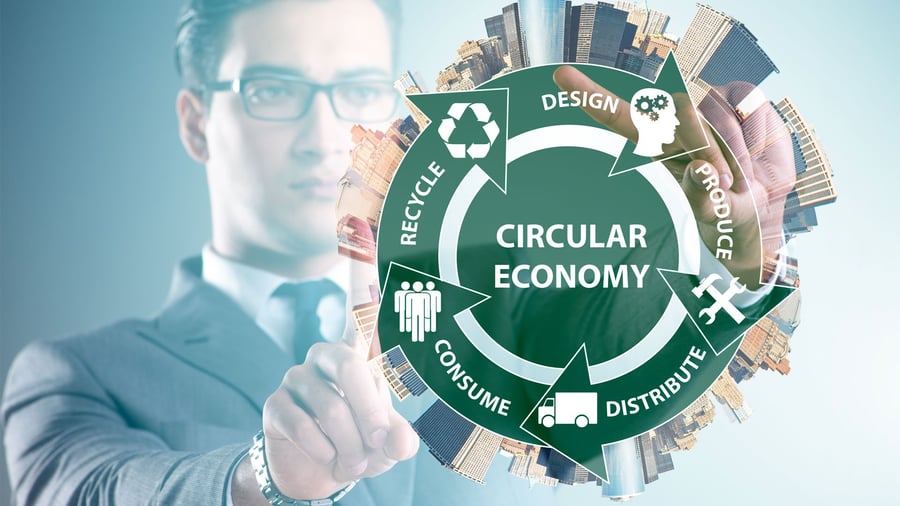How sustainability and innovation transform key sectors to shape a greener and more responsible future?
Circular Economy: A Common Endeavor Across Different Sectors
In a historical moment where sustainability is an unavoidable duty, the circular economy emerges as a strategic business cornerstone. Anchored in principles of reduction, reuse, and recycling, this philosophy transcends mere ethics, representing a true catalyst for innovation and competitiveness. How does this vision materialize in different contexts?
This article will explore seven emblematic examples of the circular economy, highlighting how various industrial realities converge toward a shared vision of sustainability and renewal.
Automotive: Reuse of Components and Sharing Solutions
The adoption of the circular economy has brought profound changes in vehicle design, production, and use. Standard practices include the retrieval of components for interior fabrication and external coatings. Additionally, the concept of mobility sharing, with ride-sharing and car-sharing services, has gained traction, reducing the number of vehicles in circulation and promoting more efficient resource utilization.
Engineering and Construction: Push towards Innovative Materials
In the engineering and construction sectors, circular economy examples abound. To reduce the exploitation of natural resources and waste generation, highly recyclable composite materials are being studied and employed for buildings with low environmental impact and increased energy efficiency. Components extracted from old structures, such as concrete and metals, are reused in further construction works. Companies are also transforming plastic waste into construction blocks, and the sector is witnessing a rise in rental and sharing services for costly construction machinery.
Logistics and Transportation: Supply Chain Optimization
A significant example of a circular economy is reverse logistics, involving recovering goods and components at the end of their life cycle to reduce waste and promote reuse or recycling. Artificial Intelligence (AI) is increasingly used to efficiently trace products, identify materials, and redirect them to the appropriate disposal or regeneration channels. In the transportation sector, sustainability and circularity are ensured through:
- Software optimizing load management and route calculation.
- Intelligent warehouses provide real-time monitoring for better resource allocation.
- Shared transportation to avoid empty trips.

Energy and Resources: Recycled Materials as Allies for Renewables
The energy sector is not immune to the transformative influence of the circular economy. In addition to the focus on renewable energies and new technologies for storage, the use of recycled or sustainable materials in energy production has become indispensable. Numerous companies employ recycled materials to manufacture solar panels and wind turbines, limiting the exploitation of natural resources and environmental impact.
Retail and Consumer Products: Embracing Products in a New Way
In retail, impactful strategies include eco-friendly design, creating more durable, repairable products and easily disassembled for component reuse. This extends the product lifecycle effectively. Packaging becomes more easily reusable and recyclable, abandoning single-use practices. The Product-as-a-Service model emerges, offering a product as a service where the customer pays for access rather than ownership. Rental, leasing, repurchase programs, second-hand sales, and closed-loop supply chains are all examples of circular economy practices that complete the picture.
Fashion and Luxury: Fashion and Luxury Serving the Environment
In the world of fashion and luxury, in addition to the increasingly common use of recycled and recyclable fabrics, there are numerous programs for collecting used clothing. Customers can return worn garments in exchange for discounts on future purchases, while the returned clothing is repaired and resold for further use. The industry is also experimenting with new models of clothing and accessory rentals, promoting targeted use, resource sharing, and valorization. Finally, using Artificial Intelligence allows for precise demand forecasting, reducing excess production and inventory, and contributes, along with digital passports, to the certification of the authenticity of the garments.
Financial Services: The "Green" Turn in Investments
Examples of support for the circular economy are increasingly numerous in the financial sector. ESG (Environmental, Social, Governance) investments are rising, where sustainability is not just an added value but a prerequisite. Funds and portfolios focus on companies adopting circular practices, emphasizing economic returns in synergy with environmental benefits. Green bonds, aimed at financing eco-friendly projects, are gaining popularity among institutional investors, and banks are introducing preferential loans for businesses with strong environmental ethics.

A Circular Future, Between Ethics, Profit and Technology
Environmental awareness is shaping the future of business. The seven examples of the circular economy discussed testify to the ongoing transformation, demonstrating that sustainability and profit can effectively coexist.
From the sharing of industrial machinery to the recognition of the authenticity of fashion items, the fundamental role of technology in enabling these new business models becomes evident: the shift from a simple transaction to a continuous relationship requires the support of powerful, flexible, and communicative technological platforms.
For today's business leaders, integrating these models is imperative to redefine the relationship between products and users, transforming occasional consumers into loyal supporters of change: circular innovation will be the key to entrepreneurial success tomorrow.
Transform with Avvale
Circularity is a profitable business model built to flourish in the future. People plus our proprietary methodology, multiplied by the power of technology equals measurable, concrete results from the onset. Get in touch to see how Avvale can empower your move to the cloud and towards a profitable, sustainable circular business model.





